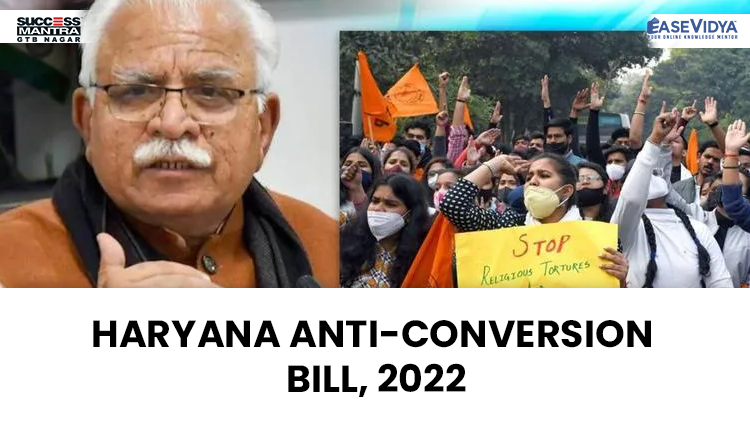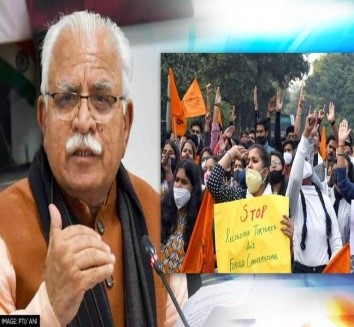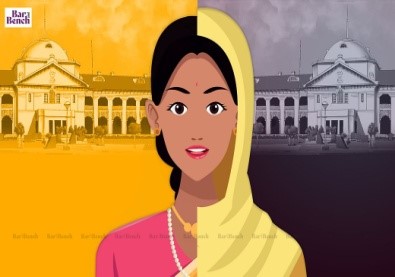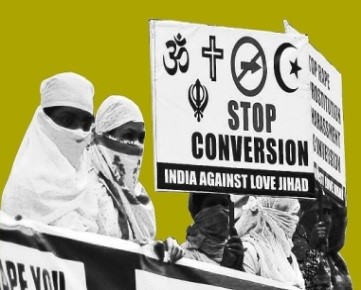
HARYANA ANTI CONVERSION BILL 2022
HARYANA ANTI-CONVERSION BILL, 2022
The bill is being brought in the state of Haryana to prevent unlawful religious conversions. Haryana is a BJP ruled state. The other BJP ruled states that brought in the bill were UP, HP, MP and Karnataka. Several “Love Jihad” incidents were reported in the state. Love Jihad is a term used in the country to address Muslim men forcing Hindu girls to convert to Islam. There are pseudo social organisations that use this strategy to convert vulnerable sections of the society. This phrase is not found in central government laws or state government laws. However, it is commonly used in politics.

Current Affairs Notes By Success Mantra Coaching Institute GTB Nagar Delhi CLICK HERE
WHAT DOES THE BILL SAY?
It aims to prohibit religious conversions through undue influence, misrepresentation, allurement, coercion or other fraudulent means. The bill includes greater punishments for conversions in women, scheduled caste and scheduled tribe. If any of the marriages were performed by concealing the religion, the marriage shall be declared void or null under the bill. The designated authority will make enquiries. The Right to freedom of religion cannot be extended to interpret collective right to convert. Because it belongs to the person converting. Still there are mass conversions happening in the country. The people converting are mostly the vulnerable sections. Such people are offered allurements for conversion. In some place, the men marry the girls concealing their identity. They reveal that they follow Islam after getting married. Also, they force their wives to get converted. The individuals converting from one religion to another should submit a declaration that the conversion is not being done under unlawful means. The term unlawful means by use of force, fraudulent means, coercion, undue influence or under threat.
ANTI-CONVERSION LAWS IN INDIA
Constitutional Provision: The Indian Constitution under Article 25 guarantees the freedom to profess, propagate, and practise religion, and allows all religious sections to manage their own affairs in matters of religion; subject to public order, morality, and health. However, no person shall force their religious beliefs and consequently, no person should be forced to practice any religion against their wishes.
Existing Laws: There has been no central legislation restricting or regulating religious conversions. However, since 1954, on multiple occasions, Private Member Bills have been introduced in (but never approved by) the Parliament, to regulate religious conversions. Further, in 2015, the Union Law Ministry stated that Parliament does not have the legislative competence to pass anti-conversion legislation. Over the years, several states have enacted ‘Freedom of Religion’ legislation to restrict religious conversions carried out by force, fraud, or inducements.

PRAVAHINI Current Affairs Notes By Success Mantra Coaching Institute GTB Nagar Delhi CLICK HERE
SUPREME COURT ON MARRIAGE AND CONVERSION
- Hadiya Judgement 2017: Matters of dress and of food, of ideas and ideologies, of love and partnership are within the central aspects of identity. Neither the State nor the law can dictate a choice of partners or limit the free ability of every person to decide on these matters. The principle that the right to marry a person of one’s choice is integral to Article 21.
- S. Puttaswamy or ‘privacy’ Judgment 2017: Autonomy of the individual was the ability to make decisions in vital matters of concern to life.
- Other Judgements: The SC in its various judgments has held that faith, the state and the courts have no jurisdiction over an adult’s absolute right to choose a life partner. India is a “free and democratic country” and any interference by the State in an adult’s right to love and marry has a “chilling effect” on freedoms. Intimacies of marriage lie within a core zone of privacy, which is inviolable and the choice of a life partner, whether by marriage or outside it, is part of an individual's “personhood and identity”. The absolute right of an individual to choose a life partner is not in the least affected by matters of faith.
INTER-FAITH MARRIAGES CHALLENGED IN SC
Recently, the law that governs inter-faith marriages in the country, the Special Marriage Act (SMA), 1954, is being challenged in the Supreme Court. In 2021, petitions were filed to strike down several of its provisions.
The Special Marriage Act (SMA), 1954
It is the legislation made to validate and register interreligious and inter-caste marriages in India. It allows two individuals to solemnise their marriage through a civil contract. No religious formalities are needed to be carried out under the Act. This Act includes Hindus, Muslims, Christians, Sikhs, Jains, and Buddhists marriages. This Act applies not only to Indian citizens who belong to different castes and religions but also to Indian nationals who live abroad.

ABOUT THE CURRENT PETITION
- Section 5 of the SMA requires a person marrying under this law to give a notice of intended marriage.
- Section 6(2) says it should be affixed at a conspicuous place at the office of the marriage officer.
- Section 7(1) allows any person to object to the marriage within 30 days of the publication of the notice, failing which a marriage can be solemnised under Section 7(2).
- Due to these provisions breaching personal liberties, several inter-faith couples approached the Court, challenging Sections 6 and 7 of the Act.
ABOUT INTERFAITH MARRIAGES
The matrimonial relationship developed between two individuals having different religious faiths. Although marrying into a different religion is a matter of choice for an adult, there are certain issues regarding the same.
Issues with Interfaith Marriages: Interfaith marriages are believed to be a forced conversion of one of the spouses (mostly women). As per the Muslim Personal law, in order to get married to a non-Muslim, conversion of religion is the only way. Hindu religion allows only monogamy and those who want to marry a second time take another course. There is no provision regarding caste determination of children born out of such marriages. The Special Marriage Act, 1954 is not compatible with backwardness of the society. There is debate over the validity of Article 226 in the context of annulling the interfaith marriage by the high court.
- Article 226: Power of high courts to issue certain writs.
Asymmetrical with Various Supreme Court’s Judgements:
The Supreme Court in Shafin Jahan v Ashok KM (2018), has upheld the right to marry a person of one’s choice as a part of Article 21. According to the Supreme Court, the Constitution protects the ability of each individual to pursue a way of life or faith to which she or he seeks to adhere. Therefore, the right to marry a person of one’s choice is integral to Article 21 of the Constitution. Further, Supreme Court in K.S. Puttaswamy v UOI (2017) judgement held that “right of choice of a family life” as a fundamental right.
Patriarchal Roots: This shows the law has deep-seated patriarchal roots, wherein women are infantilised, placed under parental and community control, and denied the right to take life decisions, should those decisions not be agreeable to their guardians.
TEST YOURSELF
Q.1 After Karnataka, which of the following BJP ruling states have passed the Anti-conversion Bill?
- Gujarat
- Haryana: ANSWER
- Uttarakhand
- None of the above
Q.2 In recent times many States have passed anti-conversion laws restricting religious conversion. Which of the following is not one of them?
- Chhattisgarh
- Gujarat
- Himachal Pradesh
- Punjab: ANSWER
Q.3 Which of the following articles of the Indian Constitution guarantees the freedom to profess, propagate, and practise religion, and allows all religious sections to manage their own affairs in matters of religion?
- Article 32
- Article 25: ANSWER
- Article 39
- All of the above
Q.4 Which of the following landmark judgments held that the right to choose a partner or live with a person of choice was part of a citizen’s fundamental right to life and liberty (Article 21)?
- Salamat Ansari-Priyanka Kharwar case: ANSWER
- S. Puttaswamy or ‘privacy’ Judgment, 2017
- Hadiya Judgment 2017
Q.5 Under which of the following landmark judgments of the Supreme Court it has been held that 'Right of choice of a family life” is a fundamental right?
- KS Puttaswamy v. Union of India
- SR Bommai v. Union of India
- Navtej Singh Johar v. Union of India
- None of the following












0 Comment